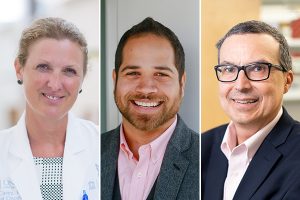
Susan G. Komen® today announced it was providing $1.45 million in research grants to three UNC Lineberger Comprehensive Cancer Center members as part of a national campaign focused on metastatic breast cancer, developing new, more-effective treatments, and addressing disparities in breast cancer outcomes. The grants support Komen’s commitment to achieve its Bold Goal to reduce the current number of breast cancer deaths in the U.S. by 50 percent by 2026.
“In order to save more lives, we must address the main cause of breast cancer deaths: metastatic breast cancer,” said George Sledge, MD, Susan G. Komen’s chief scientific advisor, and professor of medicine and chief of the Division of Oncology in the Department of Medicine at Stanford University.
Komen awarded grants to Lisa Carey, MD, FASCO, Hector Franco, PhD, and Charles Perou, PhD.
“We are extremely grateful for Komen’s longstanding commitment to supporting breast cancer research, and they have been a wonderful long-term partner in our groundbreaking Carolina Breast Cancer Study,” said Shelton Earp, MD, director of UNC Lineberger. “Many advances in breast cancer care we provide our patients today are the result of laboratory and clinical research funded by Komen. The latest round of research grants, including those awarded to Lisa Carey, Hector Franco and Chuck Perou, will make a difference in how we care for our patients in the future.”
Carey, who is a Komen Scientific Advisory board member and the Richardson and Marilyn Jacobs Preyer Distinguished Professor in Breast Cancer Research at UNC Lineberger and the UNC School of Medicine, will receive $400,000 to study how HER2+ tumors respond to HER2-targeted therapies. This project will integrate and analyze data from more than 1,300 women participating in six neoadjuvant, first step treatment, clinical trials of HER2- targeted therapies to learn how therapy for HER+ breast cancer patients can be improved.
Franco, who is an assistant professor of genetics at UNC Lineberger and the UNC School of Medicine, will receive $450,000 to study how inflammation can both drive the spread of breast cancer cells throughout the body and drug resistance in estrogen receptor positive (ER+) breast cancer. His research will help to identify diagnostic markers and treatment targets for drug resistance and metastasis.
Perou, who is a Komen Scholar and the May Goldman Shaw Distinguished Professor of Molecular Oncology at UNC Lineberger and the UNC School of Medicine, will receive $600,000 to identify the genetic drivers of the HER2-enriched subtype of HER2+ breast cancer to better understand how this type of breast cancer responds to current therapies, providing new therapeutic targets that could then be tested in a clinical trial.
“We are pleased to support research aimed at preventing breast cancers from metastasizing (spreading) and developing new, more effective treatments for metastatic disease,” added Komen’s Chief Scientific Advisor, Jennifer Pietenpol, PhD, executive vice president for research at Vanderbilt University Medical Center, director of the Vanderbilt-Ingram Cancer Center and the B.F. Byrd Jr. Professor of Molecular Oncology, at Vanderbilt University School of Medicine.
More than an estimated 154,000 women in the U.S. are living with metastatic breast cancer – the most advanced stage of breast cancer that has spread outside the breast, often to the brain, bones, liver and lungs. Currently, there is no cure for metastatic breast cancer, and it is responsible for almost all the 42,000 breast cancer deaths in the U.S. each year.
“Breast cancer does not affect everyone equally and with the grants we’re funding this year, we’re moving closer to new therapies for aggressive forms of cancer, understanding why treatment doesn’t work in some patients and making sure everyone has access to the care they need,” said Paula Schneider, CEO, Susan G. Komen.
These new funds bring Komen’s total research investment in breast cancer to more than $1 billion since opening its doors in 1982, and Komen’s investment in research focused on metastatic breast cancer to $210 million. Since its inception, Komen has funded more breast cancer research than any other non-profit outside of the U.S. government. In addition to research, Komen and its nationwide network of Affiliates serve women and men in thousands of communities. To date, more than $2.3 billion has been invested in efforts to provide critical education and real-time support to people in communities across the country.
Komen’s research grant program is supported in part by funds raised by the organization’s nationwide network of Affiliates. Each year, Affiliates contribute at least 25 percent of local funds raised to research, while the remainder of their funds help provide vital education and real-time support to people facing breast cancer today in their communities.
Since 1997, Komen North Carolina Triangle to the Coast has funded $13,657,463 to community programs serving local women and men, while contributing $5,333,897 to Komen research.
“We are so thankful for the friends, family and neighbors that fight alongside us, helping to reduce the number of breast cancer deaths central and eastern North Carolina, both on the ground and through research,” said Pam Kohl, executive director at Komen NC Triangle to the Coast.
